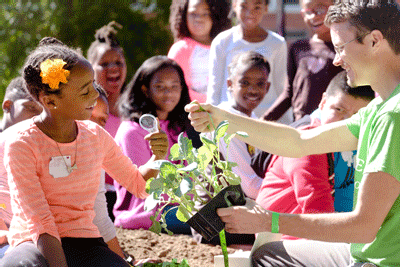BALTIMORE — School gardens have proven to be more than just a trend, and the blossoming health and education benefits that go along with them have many looking to create additional space.
That’s exactly what’s happening in Baltimore at Gwynn Falls Elementary, a Title 1 school serving more than 500 students.
On Tuesday, May 16, 2017, parents, teachers and students from the school joined the national nonprofit, REAL School Gardens and more than 100 Target employees to build an outdoor classroom in just one day.
The Texas-based nonprofit, which was founded a decade ago, provides teachers in low-income schools the tools and training needed to use learning gardens to improve science, math and literacy instruction.
“We were created for educators by educators around the idea that students could learn key academic concepts through hands-on, real-world experiences outdoors,” said April Martin, the regional executive director for Real School Gardens. “Students have an inborn natural curiosity about the world, and we wanted to give teachers the tools and the training to harness that drive to get students in low-income schools engaged in their lessons.”
Target has agreed to provide both the funding and volunteers to create Gwynn Falls’ outdoor classroom, the fourth of five planned REAL School Gardens projects across four states.
Target’s support is part of the company’s ongoing efforts to help make wellness more affordable, accessible and inspirational for guests and communities by helping students grow their own nutrient-dense vegetables and learn about healthy food choices, officials said in a release.
It costs REAL School Gardens $130,000 to launch our full three-year program at a low-income school, according to organization officials.
If a school already has a learning garden, or once Real School Gardens builds one, instructional coaches are then dispatched to the school to train teachers in one-on-one and group settings, getting them accustomed to taking math, science, and language arts lessons outdoors.
“Once teachers see how effective hands-on experiential lessons can be, they’re excited to use them more often,” Martin said. “We hear lots of teachers say that they were burned out before our program, but then they see that their students understanding better and happier to learn and their job satisfaction increases. Students love investigating the natural world and doing meaningful projects.
“They might not have thought they’d be excited to learn about acute and obtuse angles, but tell them that they need to figure out where to place a solar panel to maximize energy production and they’re all over it,” she said.
Every school wants an outdoor classroom, but there is a competitive application process because the nonprofit partners with companies to pay the lion’s share of the cost. Schools also must invest time and money into the Teacher Training Program that is required.
“We don’t just build an Outdoor Classroom and walk away. We want to make sure they’re well-used and well-maintained for years to come,” Martin said. “Once principals and teachers see how effective our instructional coaching is, word of mouth spreads pretty quickly. We offer both programs to schools of all income levels, but will only do fundraising for projects in high-poverty schools.”
The advantages of an outdoor classroom include improved STEM skills, social emotional learning, and other 21st century skill development. Partner schools have seen 12 percent to 15 percent increases in standardized test score pass rates with particular gains in science, according to Real School officials.
The REAL School Gardens Teacher Training Program has also been proven to boost teacher effectiveness and job satisfaction, and improve student engagement in their lessons.
“I think the biggest benefits are the teacher and student impacts. Students get the experiential learning they need to build a foundation of knowledge for long-term success. They also get to realize that learning is fun and exciting,” Martin said. “Teachers get to see those ‘ah ha’ moments where students finally understand, and that re-kindles their love for their work, keeping them from getting burned out and leaving the schools that need them most.”
